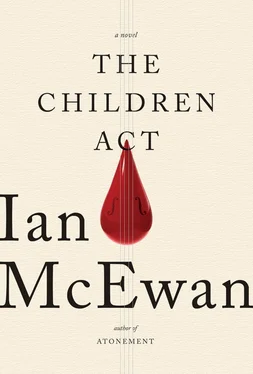Without waiting, she began to play the ten bars of introduction, the softly insistent chords. From the corner of her eye, she saw him putting on his reading glasses. Then the fine tenor voice, obedient to the composer’s marking of dolce , swelled sweetly.
Quand viendra la saison nouvelle ,
Quand auront disparu les froids…
For fifty-five minutes they forgot about the law.
IN DECEMBER, ON the day of the concert, she was home from court by six and in a hurry to shower and change. She heard Jack in the kitchen and called a hello to him as she passed on her way to her bedroom. He was bending over by the fridge and grunted in return. Forty minutes later she emerged into the hallway in a black silk dress and high-heeled shoes of black patent leather. They gave her good leverage with the pedals. Around her neck she wore a simple silver band. Her perfume was Rive Gauche. From the sitting room’s rarely touched hi-fi came the sound of piano music, of an old Keith Jarrett record, Facing You . The first track. She paused outside her bedroom door to listen. It had been a long time since she’d heard that hesitant partly realized melody. She’d forgotten how smoothly it gathered confidence and leaped into life as the left hand plunged into a strangely altered boogie which became an unstoppable force, like an accelerating steam locomotive. Only a classically trained musician could set his hands free of each other the way Jarrett did. That, at least, was her partial judgment.
Jack was sending her a message, for this was an album, one of three or four, that formed the sound track of their long-ago courtship. Those days, post-finals, after the all-women Antony and Cleopatra , when he persuaded her to spend first one, then dozens of nights in the room under the eaves with the east-facing porthole. When she understood that sexual ecstasy was more than an overinflated term. When, for the first time since she was seven years old, she screamed in pleasure. She had tumbled backward into a remote unpeopled space, and later, lying side by side in bed, sheets to their waists like postcoital movie stars, they laughed at the din she had made. No one in the flat below, fortunately. He, cool long-haired Jack, told her it was the greatest compliment he’d ever received. She told him she could not imagine regaining the strength, in her spine, in her bones, to go back there again. Not if she was to return alive. But she did, often. She was young.
It was during this time, when they weren’t in bed together, that he thought he might further seduce her with jazz. He admired her playing but wanted to prise her loose from the tyranny of strict notation and long-dead genius. He played her Thelonious Monk’s “Round Midnight” and bought her the sheet music. It wasn’t difficult to play. But her version, smooth and unaccented, sounded like an unremarkable piece by Debussy. That was fine, Jack told her. The great jazz masters adored and learned from him. She listened again, she persisted, she played what was in front of her, but she could not play jazz. No pulse, no instinct for syncopation, no freedom, her fingers numbly obedient to the time signature and notes as written. That was why she was studying law, she told her lover. Respect for the rules.
She gave up, but she did learn to listen, and it was Jarrett she came to admire above all others. She took Jack to hear him at the Colosseum in Rome. The technical facility, the effortless outpouring of lyrical invention as copious as Mozart’s, and here it was again after so many years, still holding her to the spot, reminding her of who she and Jack once playfully were. The music was artfully chosen.
She went along the hall and paused again at the entrance to the sitting room. He had been busy. A couple of lamps with long-expired bulbs at last lit. Several candles around the room. The curtains drawn against the winter evening’s light rain and, for the first time in more than a year, a well-established fire in the grate, logs as well as coal. Jack was standing by it with a bottle of champagne in his hand. In front of him, on a low table, a plate of prosciutto, olives and cheese.
He was wearing a black suit, white shirt without a tie. Still sleek. He came over, put in her hand a champagne flute and filled it, then poured his own. His expression was severe as they raised and touched glasses.
“We don’t have much time.”
She took him to mean that soon they should be leaving to walk over to the Great Hall. It was madness to be drinking before a concert, but she didn’t care. She took a second mouthful and followed him to the fire. He offered her the plate, she took a lump of Parmesan, and they stood on each side of the fireplace, leaning against the mantelpiece. Like giant ornaments, she thought.
He said, “Who knows how much. Not many years. Either we start living again, really living, or we give up and accept it’s misery from here to the end.”
An old theme of his. Carpe diem . She raised her glass and said solemnly, “To living again.”
She saw the slight shift in his expression. Relief and, beyond it, something more intense.
He refilled her glass. “Concerning which, the dress is fabulous. You look beautiful.”
“Thank you.”
They held each other’s gaze until there was nothing to do but go toward each other and kiss. They kissed again. His hand was lightly on the small of her back and he did not move it down across her thigh as he used to do. He was taking this in stages, and his delicacy touched her. If a grand musical and social obligation had not been laid upon them, she did not doubt where this release would have led them. But her sheet music was behind her on the couch and their duty was to stay fully dressed. So they drew together tightly and kissed once more, then separated, picked up their glasses, touched them in silence and drank.
He sealed up the champagne with a cunning springed device she had given him many Christmases ago. “For later,” he said, and they laughed.
They fetched their coats and went out. To steady herself on her heels, she walked to the hall on her husband’s arm, under his umbrella, which he gallantly held above her head and not his own.
“You’re the performer,” he said. “You’re the one with the silk dress.”
A roar of small talk and laughter announced a crowd of a hundred and fifty or so, standing about with glasses of wine. The chairs were set out but no one was sitting yet; the Fazioli and a music stand were in position onstage. Members of Gray’s, benchers, most of her professional and social life gathered in one place. For more than thirty years she had worked with and against dozens of people she could see. Various eminences, many from outside, from Lincoln’s or Inner or Middle Temple—the Lord Chief Justice himself, some from the Court of Appeal, two Supreme Court justices, the attorney general, a score of well-known barristers. The executives of the law, who settled fates and deprived citizens of their liberty, had a developed sense of humor and a passion for shoptalk. The sound was deafening. Within minutes, she and Jack had lost sight of each other. Someone came up and wanted help from him with some Latin. She was drawn into a circle of gossip about an eccentric friend of the Master of the Rolls. She hardly needed to move from where she stood. Friends came up to embrace her and wish her luck, others shook her hand. It had been a masterstroke of Pension, the Gray’s Inn benchers’ committee, to allow the concerts to be preceded by a party. Wine, Fiona hoped, might soften the critical faculties of the Wigmore Hall faction.
When a waiter with a silver tray came by, she was feeling too well to refuse. As she took a glass, Mark Berner appeared in her line of sight, some fifty feet and a hundred people away, wagging a forbidding finger. He was right, of course. She raised her glass to him and took a sip. A friend, a stalwart of the Queen’s Bench, steered her over to meet a “brilliant” barrister who happened to be his nephew. Watched over by the proud uncle, she asked solicitous questions of a thin young man with a pitiful stutter. She was beginning to long for livelier company when an old girlfriend from Middle Temple barged in, hugged her and stole her away to a circle of mutinous young women barristers who told her, though in humorous terms, that they weren’t getting the quality work. It was going to the men.
Читать дальше












